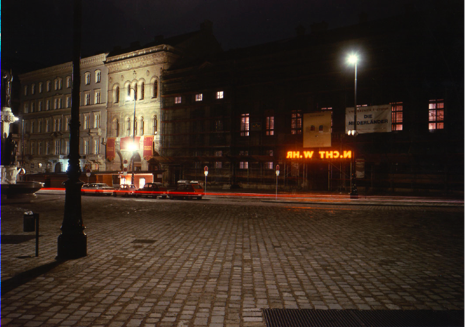N.CHT W.HR (1989) Placed on the façade of a
18th century palace that also was used as a movie
location by Hitchcock for his movie 39 Steps there
was visible an enigmatic statement in reverse
reading order. By leaving out the phonemes it gave
rise to the possibility to fill in different words
and so to generate different meanings. The work was
based on the invitation to make an artwork to
perform for a specific art space. I proposed to
divert the presumed working of an inner and outer
world of art and placed the artwork into another
realm by using the architectural inner-outer
division of the façade. That meant that the work
would not act as a typical isolated artwork or as a
typical piece of applied street based functional
object.
Its utilitarian mode was to think differently about
the schism between art as a profound activity and
daily life as the ordinary one. Also to question
why the identity of a building was primarily based
on its faced function. What would happen if the
work would play with that functionality? What would
happen if the work would reverse these assumptions
to announce that the outer world of a museum is now
the most art like (designed fiction) and all that
takes place in a museum is actually real? Or leave
this even, because of the blanks in the words, as
undecidable?
Specifications:
Dimensions: 12m. by 1.10m.
Material: Aluminium boxletters, Chainlight system
activated by time-clock, high quality acrylate.
Exhibited: 'Unbegrenzte Freyung: die Niederländer', Vienna, Austria (1989). Schloss Ringenberg, Germany (1997).
Exhibited: 'Unbegrenzte Freyung: die Niederländer', Vienna, Austria (1989). Schloss Ringenberg, Germany (1997).
